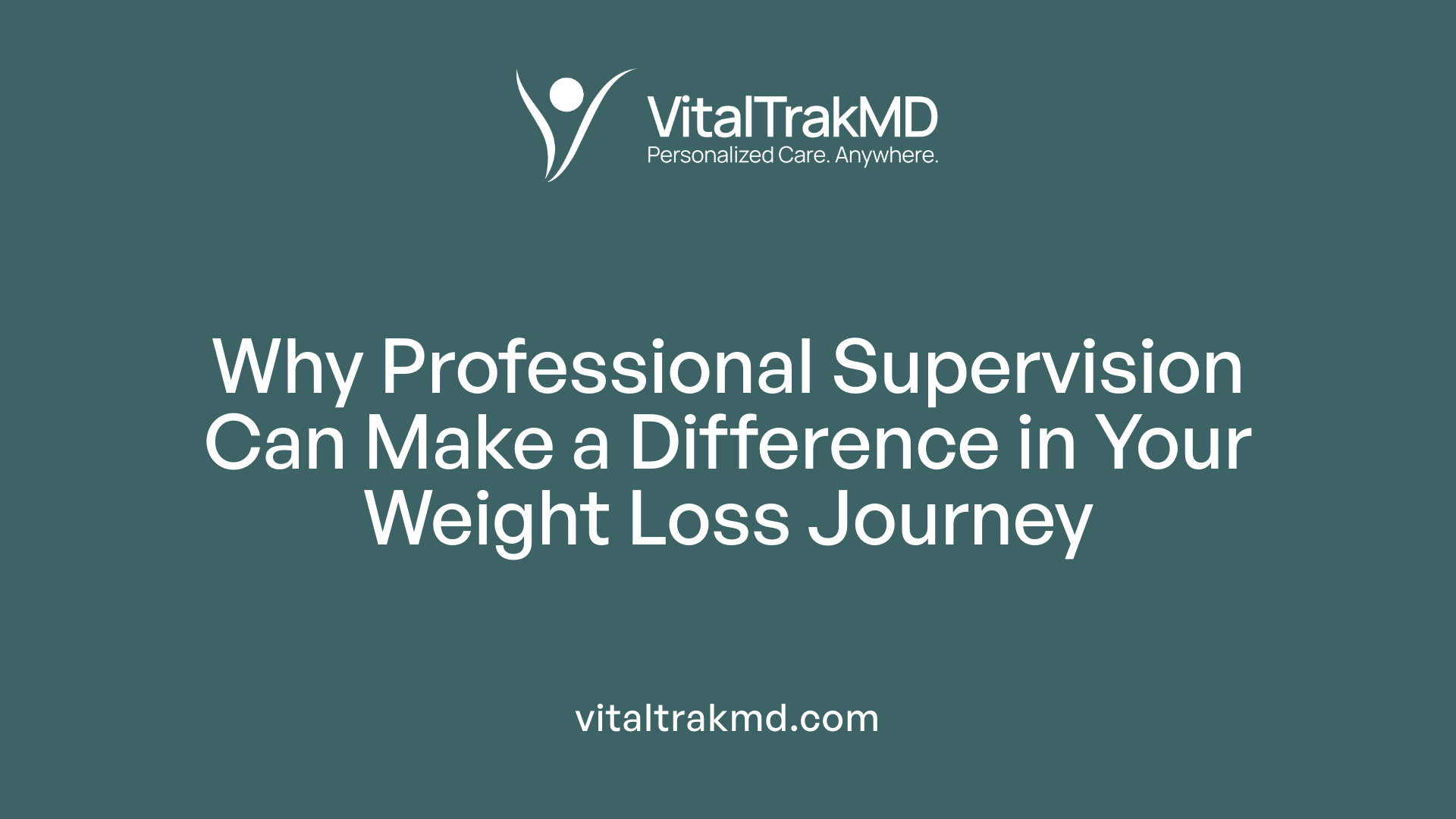Weight Loss Clinics vs Personalized Home-Based Plans

Understanding Your Weight Loss Options
Deciding on the right weight management approach involves understanding the differences, benefits, costs, and suitability of medical clinics versus personalized home-based plans. Each method offers unique advantages tailored to individual lifestyles, health conditions, and motivation levels. This article explores these options in depth to help you make an informed decision.
Differences in Structure and Supervision between Programs
What are the differences between medical weight loss clinics and personalized home-based weight loss plans?
Medical weight loss clinics and home-based plans are two distinct approaches to weight management, each with unique structures, supervision levels, and support systems.
Medical clinics typically operate under the direct supervision of licensed healthcare professionals, such as physicians or nurse practitioners specialized in obesity medicine or internal medicine. These clinics offer personalized treatment plans that include medical testing—such as lab work and vital sign monitoring—to assess each patient's health status thoroughly. Based on these assessments, doctors may prescribe FDA-approved weight loss medications like Semaglutide or phentermine, carefully tailored to individual health profiles.
In addition to medication, medical clinics include behavioral therapy, nutritional counseling, and lifestyle coaching. Regular follow-ups enable clinicians to monitor progress, manage potential side effects, and adjust treatments as needed. This comprehensive oversight ensures safety, especially for patients with chronic conditions such as diabetes, hypertension, or hormonal imbalances. Medical clinics also support long-term weight management and health improvements, emphasizing sustained lifestyle changes.
On the other hand, personalized home-based weight loss plans primarily rely on digital tools, online resources, and the individual's motivation. These plans often include calorie counting apps, online education, habit trackers, and virtual coaching, which promote lifestyle modifications without requiring frequent in-person visits. Users can access meal plans, exercise routines, and community support through websites or mobile apps.
Home-based programs prioritize convenience, affordability, and flexibility, making them attractive for busy individuals or those on a budget. However, they usually involve limited or no direct medical supervision. This lack of oversight means there is less personalized medical testing or medication management, which can be a drawback for individuals with complex health issues or those needing tailored interventions.
In-person clinics offer structured, face-to-face support that can lead to more consistent accountability and personalized assessment. Clinicians can evaluate progress through physical examinations, laboratory tests, and real-time interactions, providing immediate feedback and modifications. Conversely, online and home-based programs empower users to learn and progress at their own pace, fostering autonomy but sometimes at the expense of expert guidance.
While both approaches are effective for different populations, the choice often depends on individual health status, motivation levels, access to healthcare, and personal preferences. Overall, medical clinics focus on safety and customization within a supervised medical environment, whereas digital and home-based plans emphasize accessibility, convenience, and self-directed efforts.
Benefits and Effectiveness of Medical versus Home-Based Plans

What are the benefits of medical weight loss clinics compared to home-based plans?
Medical weight loss clinics excel in offering professional oversight, making them a superior choice for individuals with complex health conditions or significant weight to lose. These clinics are staffed by licensed physicians, nurse practitioners, or obesity specialists who perform thorough health assessments, including lab work and vital monitoring. This comprehensive approach ensures that weight loss strategies are safe, personalized, and tailored to each person's unique medical profile.
One major advantage is the ability to prescribe FDA-approved weight loss medications, such as Semaglutide or phentermine-topiramate. These medications have been proven effective for reducing appetite, increasing satiety, and supporting sustained fat loss. When integrated into a treatment plan, medication therapy can significantly accelerate weight loss and improve adherence.
Behavioral therapy and lifestyle counseling are integral parts of clinical programs. These services help address emotional eating, mental health issues, and behavioral habits that influence long-term success. Ongoing support and regular follow-up visits allow clinicians to adjust interventions as needed, monitor for potential side effects, and provide motivation.
For those with medical risks like diabetes, high blood pressure, or thyroid issues, clinics offer a safe environment to pursue weight loss. They ensure that any medication use or lifestyle change adheres to medical guidance, minimizing risks.
In contrast, home-based plans, though convenient and cost-effective, often lack this level of medical oversight. They typically rely on self-directed efforts using digital tools, meal plans, or community support without professional supervision. While these plans can be effective for motivated individuals with straightforward weight loss goals, they may pose risks for those with underlying health conditions.
How do studies compare the effectiveness of clinical programs and home-based initiatives?
Research indicates that structured clinical programs generally result in greater or comparable weight loss outcomes than non-supervised plans. For example, clinical interventions incorporating FDA-approved medications like GLP-1 receptor agonists have demonstrated average weight reductions of 15-20% of body weight over several months.
A study evaluating university campus interventions found that personalized digital programs with medical input yielded significant weight loss and improvements in cardiometabolic health. The cost-effectiveness ratios showed that tailored digital interventions could be more economical relative to their health benefits, especially among overweight individuals.
Furthermore, clinical programs that include behavioral therapy and medical supervision tend to foster better adherence, address psychological barriers, and promote sustainable lifestyle changes. This comprehensive approach reduces the likelihood of weight regain, a common issue in simple diet plans.
How are behavioral therapy and lifestyle counseling integrated into clinics?
Behavioral therapy is a cornerstone of medical weight loss strategies. These services involve counseling sessions that help individuals develop healthier eating habits, manage emotional triggers, and improve mental well-being related to eating and activity. The goal is to establish sustainable behavioral modifications that support long-term weight management.
Clinics often provide nutritional guidance based on lab results and individual health profiles, suggesting specific dietary modifications. They also facilitate lifestyle counseling, including stress management, sleep optimization, and gentle physical activity plans.
By combining these elements with medical treatments, clinics aim to treat obesity as a chronic condition rather than a short-term problem. This holistic approach enhances the likelihood of maintaining weight loss over years.
What about cost-effectiveness and healthcare savings?
While initial costs for clinical programs may be higher than home-based plans, their long-term cost effectiveness can be substantial. Personalized interventions tend to produce faster and more sustainable results, reducing future healthcare expenses related to obesity-linked conditions like diabetes, heart disease, and joint problems.
Digital programs, especially those utilizing tailored online platforms with professional input, demonstrate high efficiency. They combine lower delivery costs with the potential for broad reach. The economic evaluation of such interventions often shows high value, with healthcare savings outweighing program expenses.
In summary, medical weight loss clinics, with their emphasis on professional oversight, personalized strategies, and medical therapies, offer a safer, more effective, and potentially more economical route to sustainable weight management. When compared with home-based plans, clinics provide an environment designed to optimize long-term health outcomes through comprehensive, individualized care and continuous support.
Comparative Analysis: Methods and Costs
How do the methods and costs of medical weight loss clinics compare to home-based plans?
Medical weight loss clinics provide highly personalized and medically supervised programs, often involving comprehensive health assessments, prescription medications, and ongoing clinical support. These programs usually range from $1,000 to $5,000, reflecting the high level of professional oversight, laboratory testing, customized treatment plans, and sometimes specialized medical interventions such as FDA-approved medications like Semaglutide or Tirzepatide. The benefit of these clinics lies in their tailored approach, closely monitored progress, and the integration of behavioral therapy and medical management, which can lead to faster and more significant weight loss—sometimes between 20 to 40 pounds within a few months.
On the other hand, home-based or digital plans are more cost-effective, generally costing between $372 and $700. These programs often include digital tools like meal planners, habit trackers, virtual coaching, webinars, and community support. They rely heavily on self-monitoring and motivation but may still incorporate some remote coaching or group support to enhance accountability. Such programs tend to be flexible, allowing individuals to participate at their own pace and according to their schedule.
When comparing the effectiveness relative to costs, studies indicate that online interventions can be as effective, if not more so, than traditional in-person clinics. In particular, some online programs have shown superior weight loss results in certain populations due to higher engagement and convenience. The average cost per kilogram of weight lost in digital programs is approximately $67.74 to $80, which is lower than the $88.31 per kilogram typically associated with in-clinic programs.
Benefits of digital and home-based approaches include:
- Greater affordability
- Increased accessibility
- Higher convenience and flexibility
- Ability to reach broader populations
Limitations include:
- Less direct supervision
- Limited immediate medical intervention for complex cases
- Potential reliance on user motivation and adherence
Additional considerations
While personalized medical clinics are most suitable for individuals with significant weight to lose, multiple health conditions, or those requiring medications, digital programs serve well for motivated individuals seeking sustainable weight management with less expense and effort.
| Aspect | Medical Clinics | Home-Based/Digital Plans | Details |
|---|---|---|---|
| Cost Range | $1,000 - $5,000 | $372 - $700 | Includes professional oversight vs. self-directed tools |
| Effectiveness | High, especially with medication | Comparable or superior in some cases | Based on engagement, study results |
| Cost Per Kg of Weight Lost | Approx. $88.31 | $67.74 - $80 | More cost-efficient digitally |
| Personalization | Highly tailored | Semi-personalized, based on user input | Medical assessments, lab tests, custom plans |
| Support Type | Face-to-face, medical supervision | Virtual coaching, community support | Continuing monitoring and adjustment |
| Accessibility | Limited geographically | Widely accessible | No travel needed |
| Suitability | Complex health needs, medications | Mild to moderate weight management | Based on individual health and motivation |
Final Thoughts
Both methods have their advantages and limitations, but digital approaches are increasingly supported by evidence demonstrating their effectiveness and cost-efficiency. They are especially appealing for individuals who value convenience and affordability without compromising results. That said, personalized medical clinics remain the gold standard for complex cases or those needing medical oversight, ensuring safety and potentially faster, more controlled weight loss.
Factors Influencing Choice: Medical Clinics or Home-Based Plans

What factors should influence the choice between medical weight loss clinics and home-based plans?
Deciding whether to pursue medical weight loss programs at clinics or opt for home-based digital plans depends on various personal, medical, and lifestyle factors. Understanding these elements can help individuals select the most effective approach tailored to their needs.
Medical Supervision and Health Conditions Medical clinics provide personalized assessments, medical supervision, and FDA-approved medications. They are particularly suitable for individuals with complex health issues such as diabetes, hypertension, or those on multiple medications. These clinics offer lab testing, ongoing monitoring, and tailored treatment plans, ensuring safety and addressing specific medical concerns.
In contrast, home-based plans, often self-directed or app-supported, suit healthier individuals with stable conditions who prefer convenience and independence. They primarily rely on digital tools like meal planners, habit trackers, and online coaching without direct medical oversight.
Cost and Insurance Coverage Cost is a critical consideration. Medical clinics typically involve higher expenses due to professional services, medications, and laboratory tests but are often partially covered by insurance. These programs emphasize safety and long-term health benefits.
Home-based plans are generally more affordable, especially when using free apps or online resources. They are preferred by those with budget constraints or limited insurance options, although they may lack comprehensive support.
Motivation, Support, and Accountability Motivated individuals valuing structured guidance often opt for clinics that offer behavioral therapy, professional accountability, and peer support. These elements enhance adherence and motivate sustained effort.
Alternatively, tech-savvy or independent users who feel confident managing their weight are drawn to digital programs, which provide flexibility and immediate access to resources without scheduling appointments.
Lifestyle and Time Constraints For busy individuals, home-based plans offer unmatched flexibility, allowing use around work or family commitments. They do not require travel or fixed schedules.
Conversely, those who seek more structured routines or need assistance navigating medical complexities may find clinics more suitable, providing a guided environment with scheduled check-ins.
Personal Health Goals and Readiness Individuals with higher weight loss goals, or those needing rapid, medically supervised intervention, often benefit from clinics that incorporate medications like GLP-1 receptor agonists (e.g., Semaglutide or Tirzepatide).
People aiming for gradual, sustainable weight management, or who prioritize lifestyle changes with medical support, should consider clinics. Meanwhile, participants motivated for self-management with digital tools might prefer home programs.
Summary Table of Influencing Factors
| Factor | Medical Clinics | Home-Based Plans | Main Consideration |
|---|---|---|---|
| Medical Supervision | Extensive, personalized | Limited or absent | Safety and medical needs |
| Cost | Higher, variable, often insurance-covered | Lower, usually out-of-pocket | Budget constraints |
| Support & Accountability | Professional guidance, behavioral therapy | Self-directed, peer support via apps | Motivation and accountability |
| Lifestyle Flexibility | Less flexible, fixed schedule | Highly flexible | Time management |
| Medical Conditions | Suitable for complex health issues | Less suitable unless stable | Health requirements |
| Long-term Outcomes | Emphasis on sustained health | Varies, often shorter-term focus | Goals and sustainability |
Final thoughts
Choosing between a medical clinic and a home-based digital program should be guided by individual health status, motivation level, lifestyle, and financial situation. Those with complex health needs or seeking medical oversight may benefit more from structured clinics. Conversely, individuals seeking convenience, lower costs, and independence might find digital health plans more suitable. Consulting healthcare providers can help determine the safest, most effective choice tailored to personal circumstances.
Evaluating the Long-Term Effectiveness and Worth of Investment
Are medical weight loss clinics worth the investment?
Medical weight loss clinics are generally considered a valuable investment, especially for individuals who have struggled to lose weight through standard diets and exercise routines. These clinics offer tailored, medically supervised programs that treat obesity as a chronic health condition rather than just an aesthetic goal. A primary advantage is the involvement of licensed healthcare professionals who conduct comprehensive health assessments, including lab tests and medical history reviews, to develop personalized treatment plans.
These programs often incorporate FDA-approved medications, such as GLP-1 receptor agonists like Semaglutide or Tirzepatide, which can significantly enhance weight loss by increasing satiety and reducing cravings. Alongside medication, patients receive nutritional counseling, behavioral therapy, and lifestyle coaching, all of which support sustainable, long-term weight management. Such personalized approaches tend to produce better results and reduce the risk of weight regain.
Another benefit is the emphasis on safety and medical oversight. Patients with underlying conditions like diabetes or high blood pressure are managed carefully within these clinics, reducing health risks and improving overall outcomes. Additionally, many insurance plans now cover parts of medical weight loss services, making these programs accessible and more affordable. This coverage helps offset costs for those who need extensive support.
Research underscores their effectiveness; studies show that structured, physician-led programs often lead to higher rates of significant and sustained weight loss compared to self-directed or unstructured plans. The comprehensive monitoring and tailored interventions increase adherence and motivation, reinforcing healthy habits that last beyond the active treatment phase.
For individuals seeking a safe, evidence-based, and supportive environment to achieve their weight loss goals, medical clinics provide a viable and often necessary pathway. The combination of medical expertise, personalized care, and credibility makes these programs a worthwhile investment for many, significantly improving their health, confidence, and quality of life. Overall, engaging with a reputable medical weight loss clinic can lead to improved long-term health outcomes and sustainable weight management.
Incorporation of behavioral therapy and lifestyle changes supports sustained weight management.
Healthy weight loss isn’t just about diet or medication—it involves comprehensive behavioral and lifestyle adjustments. Effective programs include ongoing counseling that targets emotional eating, stress management, sleep quality, and activity habits. These behavioral interventions help clients develop sustainable routines and resilience against future weight regain.
Many insurance plans cover medical weight loss services, offsetting costs.
Insurance coverage is increasingly available for medically supervised weight loss plans, encompassing physician visits, lab work, and approved medications. This financial support reduces barriers and makes long-term management more accessible.
Studies show structured programs achieve higher rates of significant and sustained weight loss.
Clinical evidence supports the superiority of structured, medically guided programs over do-it-yourself approaches. Participants often lose more weight and maintain their results longer when supported by healthcare professionals.
Home-based plans may require greater personal discipline but are more flexible and accessible.
Self-directed programs, including online plans or meal delivery systems, offer convenience but demand discipline and motivation from participants. They can be beneficial for motivated individuals or those with scheduling constraints.
Long-term success depends on adherence, support, and behavioral change.
Ultimately, the sustainability of weight loss hinges on ongoing support, adherence to lifestyle changes, and psychological resilience. Programs offering continuous guidance and community engagement tend to produce the best outcomes.
| Aspect | Details | Additional Notes |
|---|---|---|
| Personalization | Tailored plans based on health, genetics, and preferences | Increases effectiveness and compliance |
| Medical supervision | Regular health monitoring and medication management | Ensures safety and optimal results |
| Behavioral counseling | Support for emotional and behavioral change | Promotes sustainable habits |
| Cost coverage | Insurance reimbursements for eligible services | Enhances affordability |
| Long-term focus | Emphasis on maintaining results beyond active treatment | Critical for enduring success |
Recognizing all these factors can help individuals make informed decisions about investing in their health through medical weight loss programs. Combining medical oversight, behavioral support, and personalized care provides the best chance for achieving and maintaining a healthy weight over the long term.
Effectiveness of Clinical versus Non-Clinical Weight Strategies

What does the current evidence say about the effectiveness of clinical versus non-clinical weight management options?
Research and clinical data strongly suggest that structured medical weight loss programs with professional oversight tend to produce superior outcomes compared to do-it-yourself (DIY) or purely digital approaches. Programs supervised by healthcare providers—such as physician-led clinics, hospital-based interventions, or comprehensive outpatient strategies—are associated with more significant and sustained weight loss.
Studies show that participants in clinical programs often achieve higher percentages of body weight reduction, with many reaching or surpassing the 5% threshold considered meaningful for health improvements. For example, the Counterweight Program, which integrates medical supervision, dietary guidance, and behavioral support, has demonstrated consistent weight loss results and improved health metrics.
Long-term advantages include reduced risk of chronic diseases, better management of comorbid conditions like diabetes and hypertension, and enhanced behavioral adherence. These programs benefit from personalized assessments, medication management, laboratory testing, and ongoing accountability, all of which contribute to better success rates.
In contrast, non-clinical or DIY approaches—such as commercial weight loss apps, social media diet plans, or self-directed calorie counting—can be effective primarily for highly motivated individuals. While these strategies may offer convenience and lower costs, their outcomes tend to be less consistent and often smaller in magnitude.
Research indicates that results from self-guided digital programs can vary significantly, heavily depending on the user’s motivation, discipline, and support system. These approaches may be suitable as supplementary tools but often lack the comprehensive support necessary for long-term maintenance, especially for individuals with complex health backgrounds.
A comprehensive review of the evidence highlights the following points:
| Program Type | Effectiveness | Benefits | Limitations |
|---|---|---|---|
| Clinical, Medical Oversight | Higher success rates; significant weight loss; better long-term outcomes | Personalized plans, medical monitoring, behavioral support, medication management | Higher cost, need for in-person visits, geographical limitations |
| Non-Clinical, Digital/DIY | Moderate success for motivated individuals; smaller, less consistent weight loss | Convenience, lower costs, flexibility | Reliance on motivation; limited support; less tailored |
Overall, the data supports that integrating medical oversight, behavioral therapy, and personalized plans results in the most effective weight management. Clinical programs are particularly advantageous for individuals with significant weight to lose, complex health issues, or those in need of sustained behavioral support.
Why does clinical care lead to better outcomes?
Clinical programs benefit from a holistic approach, including initial health assessments, lab testing, prescription medications, and ongoing medical supervision. Such strategies address underlying issues like hormonal imbalances or metabolic dysfunctions, which are often overlooked in non-clinical models.
In addition, structured programs promote accountability through regular check-ins, behavioral counseling, and peer support. This ongoing engagement helps patients develop lasting habits, preventing relapse and ensuring long-term success.
In summary, evidence underscores the importance of a structured, medically supervised approach for sustainable and effective weight loss. While self-directed and digital interventions can be valuable tools, especially when combined with professional guidance, they typically do not replace the comprehensive support provided by clinical programs.
Making an Informed Choice for Your Health Journey
Selecting the appropriate weight management approach depends on individual health status, motivation level, lifestyle, and financial considerations. Medical weight loss clinics, with their expert medical supervision, prescription medications, and personalized support, are particularly suited for those with complex health needs or who seek quicker, safer results. Conversely, home-based plans provide flexibility, affordability, and autonomy, making them ideal for motivated, self-directed individuals. The evidence suggests that structured, clinical programs generally achieve more sustained and significant results, especially when combined with behavioral and lifestyle modifications. Ultimately, understanding your health needs, expectations, and available resources will guide you towards a weight loss strategy that is both effective and sustainable long-term.
References
- Online vs In-Person Weight Loss Programs: Which Delivers Better ...
- In-Home Vs. In-Clinic: Which HMR Method is Best for Your Lifestyle?
- Personalized versus generic digital weight loss interventions ...
- The Importance of Customized Weight Loss Programs
- Medical Weight Loss Clinics vs Traditional Weight Loss Clinics
- The Benefits of Customized Weight Loss Plans in 2025
- Live vs Electronically Delivered Weight-Loss Interventions
- Personalized Weight Loss Programs: Tailored Care for Success
Recent articles
Want to Feel Better and Live Healthier?
Join hundreds of patients taking control of their health with personalized care that fits their life – not the other way around.
Rated 4.8/5 by 32+ customers







